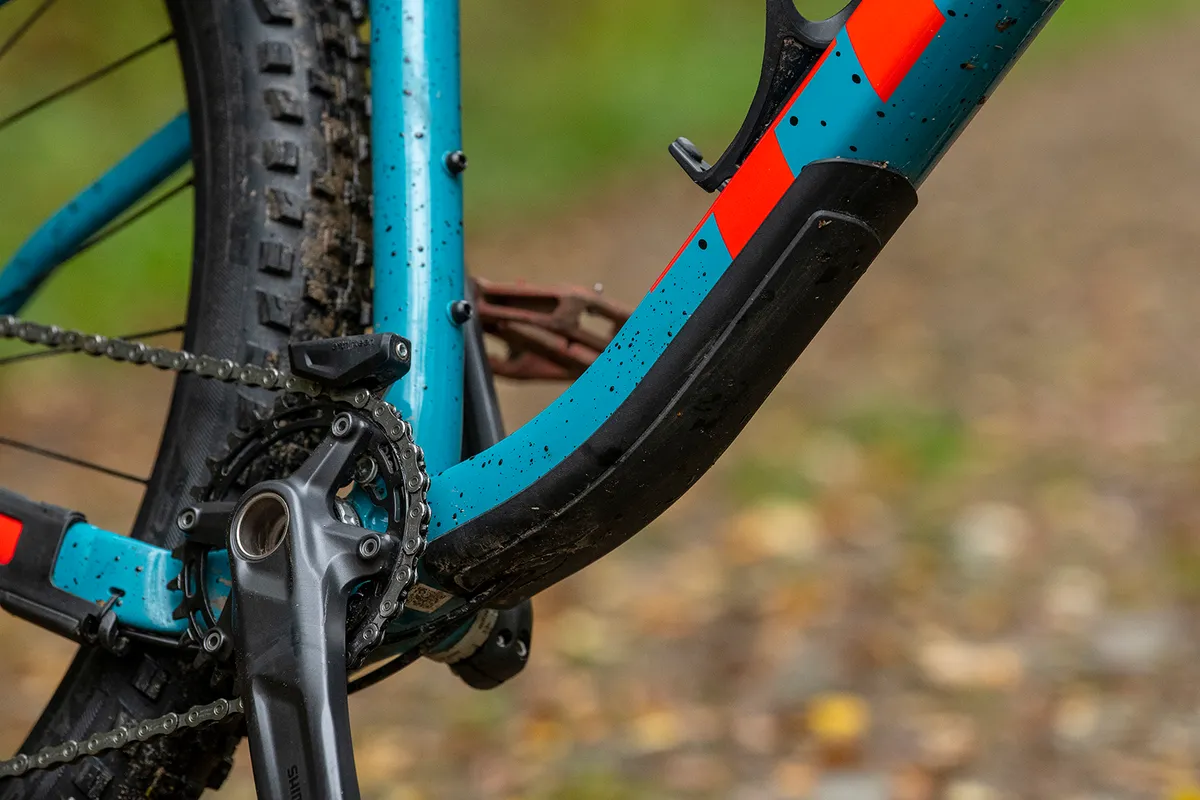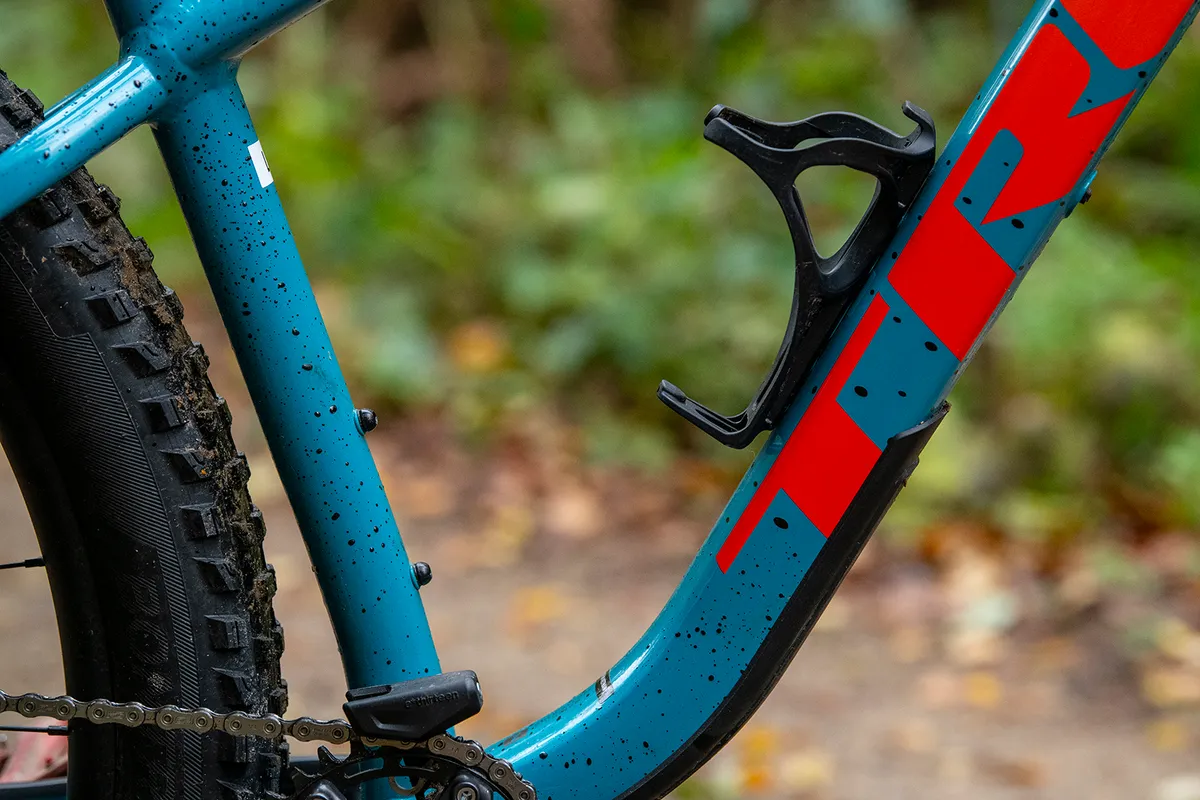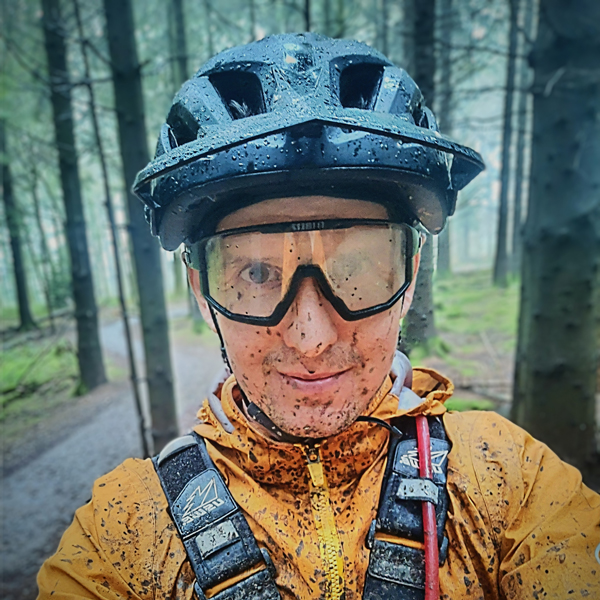Earlier this year, Trek revamped its Roscoe range with a significant geometry update and a move to 29in wheels, from 650b+.
The changes were intended to take it from an entry-level cross-country bike to a confident trail ripper.
With a focus on providing fun and thrills for all levels of riders, does the new Roscoe deliver a better riding experience? And how does it compare to the best hardtails we've tested?
Trek Roscoe 7 frame details
At the heart of the Roscoe 7 is Trek’s Alpha Gold aluminium. The mid-spec aluminium construction features butted tubes for a better strength-to-weight ratio and smoothed-out welds.
In addition, the frame's parallel seatstays and top tube give it an almost dirt-jump bike appearance.
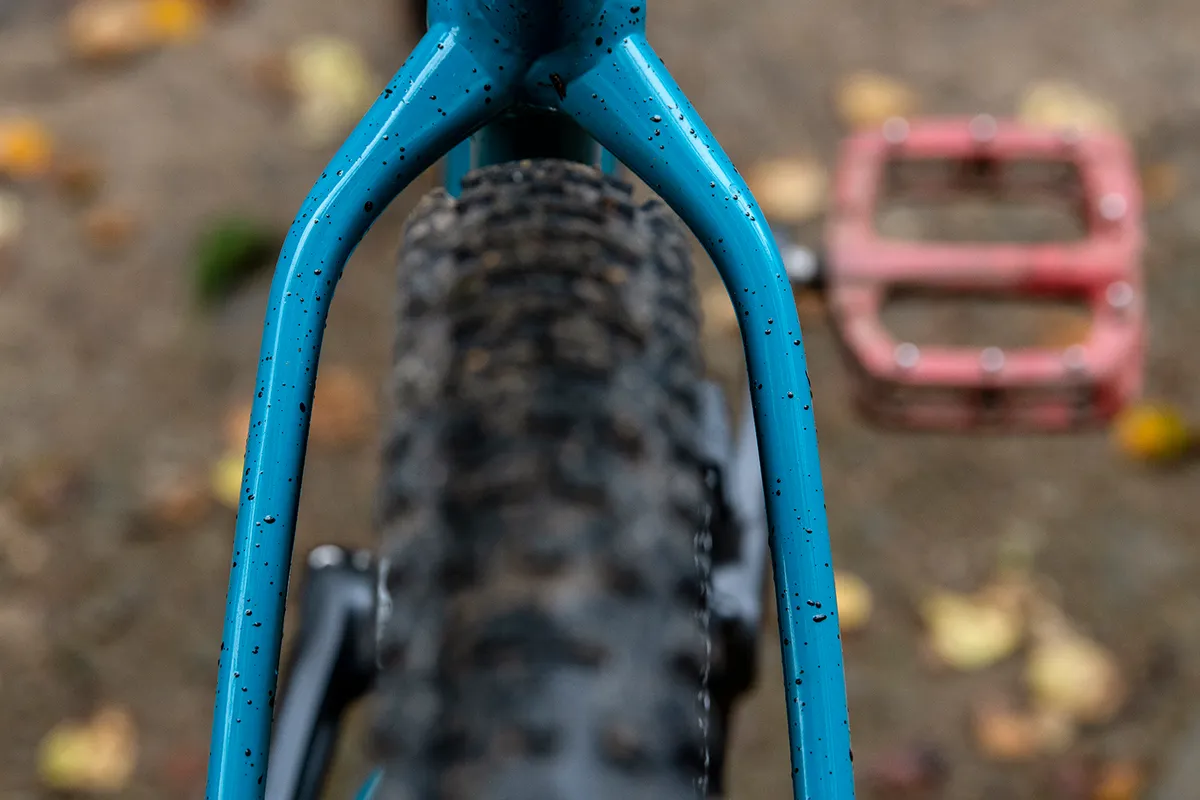
There’s plenty of frame clearance for the Trek’s wide 2.6in tyres.
Also, there’s space for two water bottles in the frame.
Finally, it features some of the best frame protection for a hardtail we’ve seen, with decent chainstay cover and a down tube fender to help see off rock strikes.
You get semi-internal cable routing through the down tube, plus it comes with boost hub spacing.
Trek Roscoe 7 geometry
The geometry updates give the Roscoe a capable 65-degree head tube angle and up-to-date 74.7-degree effective seat tube angle.
Trek has modernised the reach numbers too, and the size large tested comes with a fairly lengthy 470mm reach. Chainstay lengths are a short 430mm across all sizes.
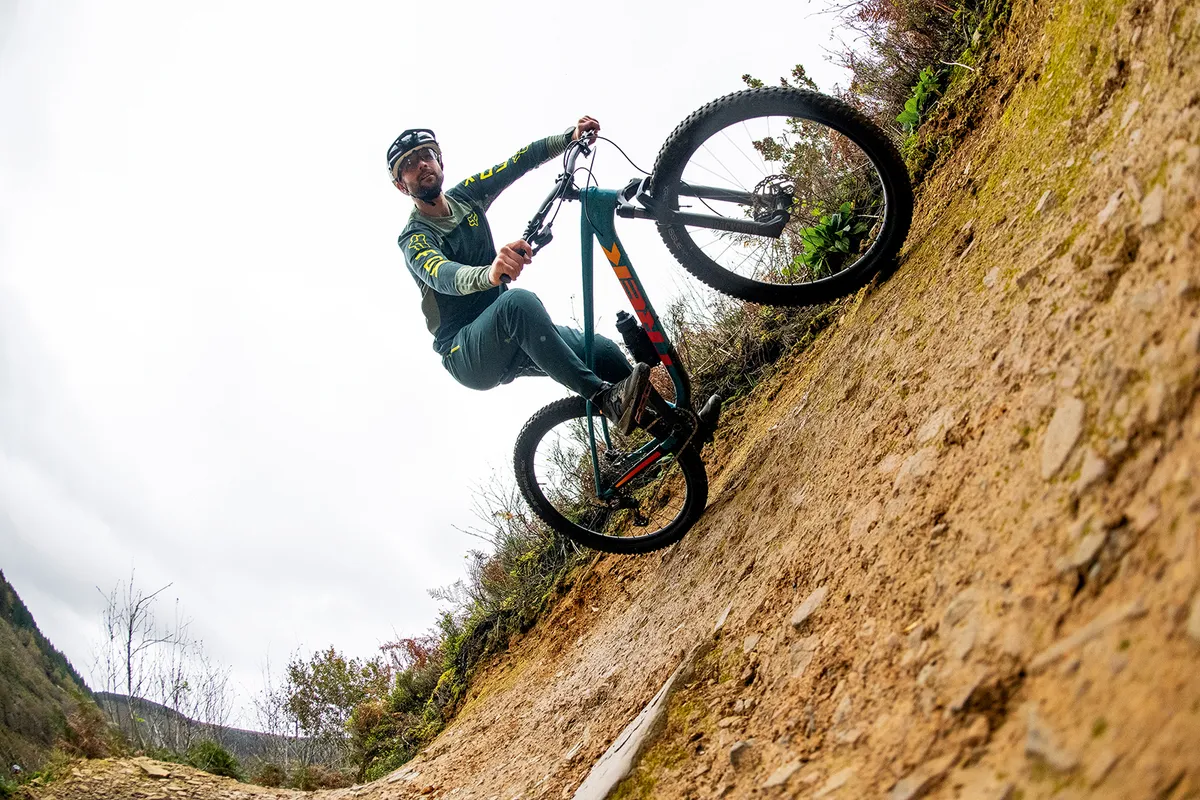
There are six sizes available and sensible seat tube lengths, so you should be able to choose between sizes depending on your reach or wheelbase preference.
For example, suppose you prefer a nimbler bike. In that case, you can select a smaller size, or, if you prefer something more stable, you should be able to size up and still not run into issues with the seat tube being too long.
Our large test bike came with a 450mm seat tube. On paper, the Roscoe’s geometry looks future-proofed.
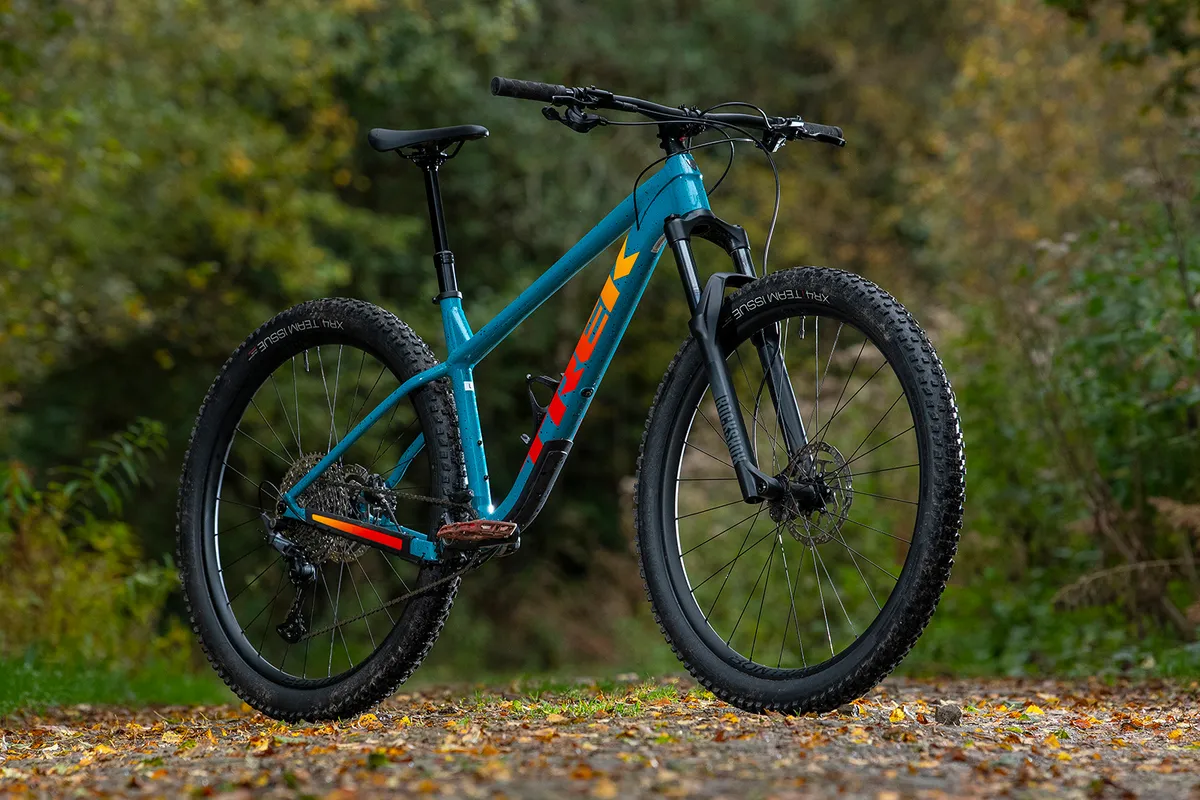
| | XS | S | M | M/L | L | XL |
|---|---|---|---|---|---|---|
| Seat angle (degrees) | 74.7 | 74.7 | 74.7 | 74.7 | 74.7 | 74.7 |
| Head angle (degrees) | 65 | 65 | 65 | 65 | 65 | 65 |
| Chainstay (mm) | 430 | 430 | 430 | 430 | 430 | 430 |
| Front centre (mm) | 690 | 721 | 751 | 768 | 785 | 820 |
| Seat tube (mm) | 340 | 360 | 420 | 435 | 450 | 500 |
| Top tube (mm) | 552 | 586 | 614 | 630 | 646 | 677 |
| Head tube (mm) | 90 | 90 | 100 | 105 | 110 | 135 |
| Fork offset (mm) | 42 | 42 | 42 | 42 | 42 | 42 |
| Trail (mm) | 12.2 | 13.1 | 13.1 | 13.1 | 13.1 | 13.1 |
| Bottom bracket drop (mm) | 45 | 61 | 61 | 61 | 61 | 61 |
| Bottom bracket height (mm) | 318.5 | 321.5 | 321.5 | 321.5 | 321.5 | 321.5 |
| Wheelbase (mm) | 1120 | 1151 | 1181 | 1198 | 1215 | 1250 |
| Standover (mm) | 729 | 741 | 748 | 742 | 755 | 765 |
| Stack (mm) | 591 | 626 | 635 | 639 | 644 | 666 |
| Reach (mm) | 390 | 415 | 440 | 455 | 470 | 495 |
| Crank length (mm) | 170 | 170 | 170 | 170 | 170 | 175 |
| Stem length (mm) | 35 | 35 | 50 | 50 | 50 | 50 |
| Handlebar width (mm) | 750 | 750 | 780 | 780 | 780 | 780 |
| Wheel size (in) | 27.5 | 29 | 29 | 29 | 29 | 29 |
Trek Roscoe 7 specifications
For this price, at £1,400, Trek hasn’t made too many compromises to the Roscoe’s spec.
You get a RockShox Recon Silver RL fork with 140mm travel, which features an air spring, external compression and rebound adjustments that mean you can set up the fork for your weight and riding style.
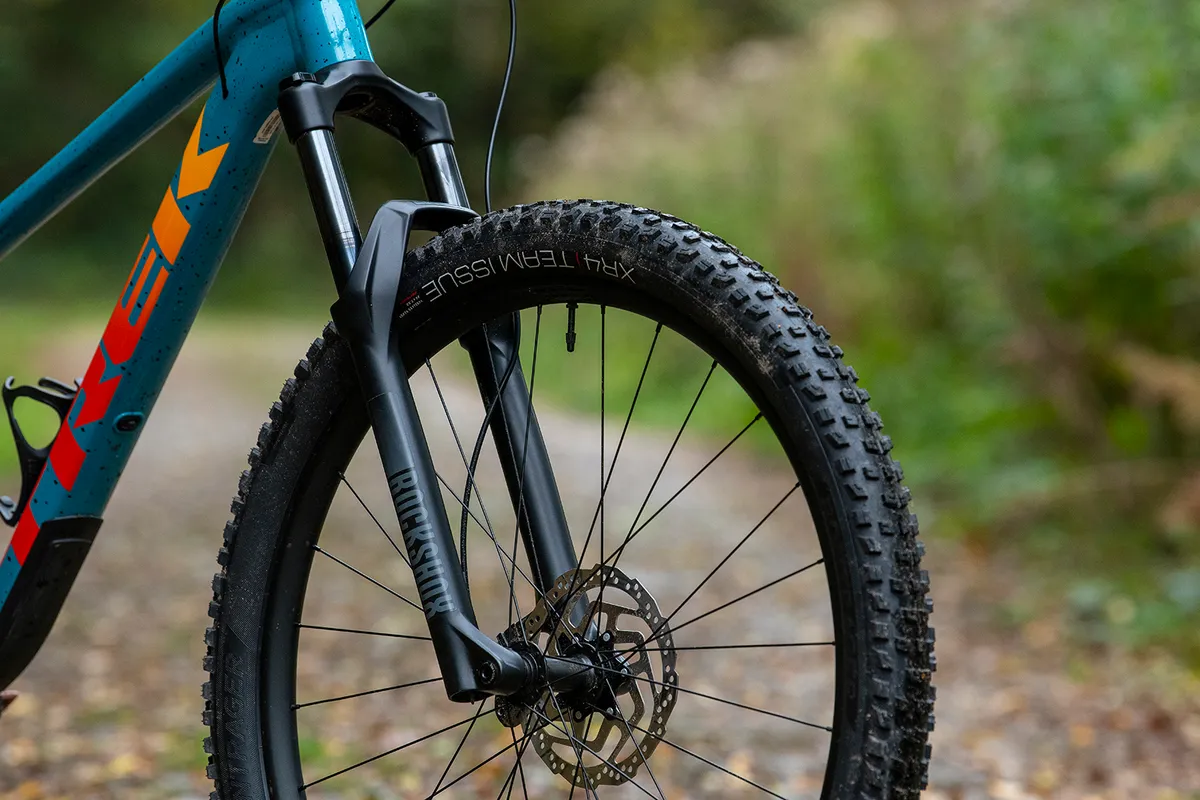
The drivetrain is Shimano’s 1x12 speed Deore range, a capable performer with a wide-range 10-51t cassette.
This is matched to a 30-tooth chainring, so there’s plenty of gear range to winch up the steepest climbs, and the smallest 10-tooth sprocket should prevent spinning out on fast descents.
The most noticeable downgrade is the brakes. Shimano’s MT 200 series use a less sophisticated level.
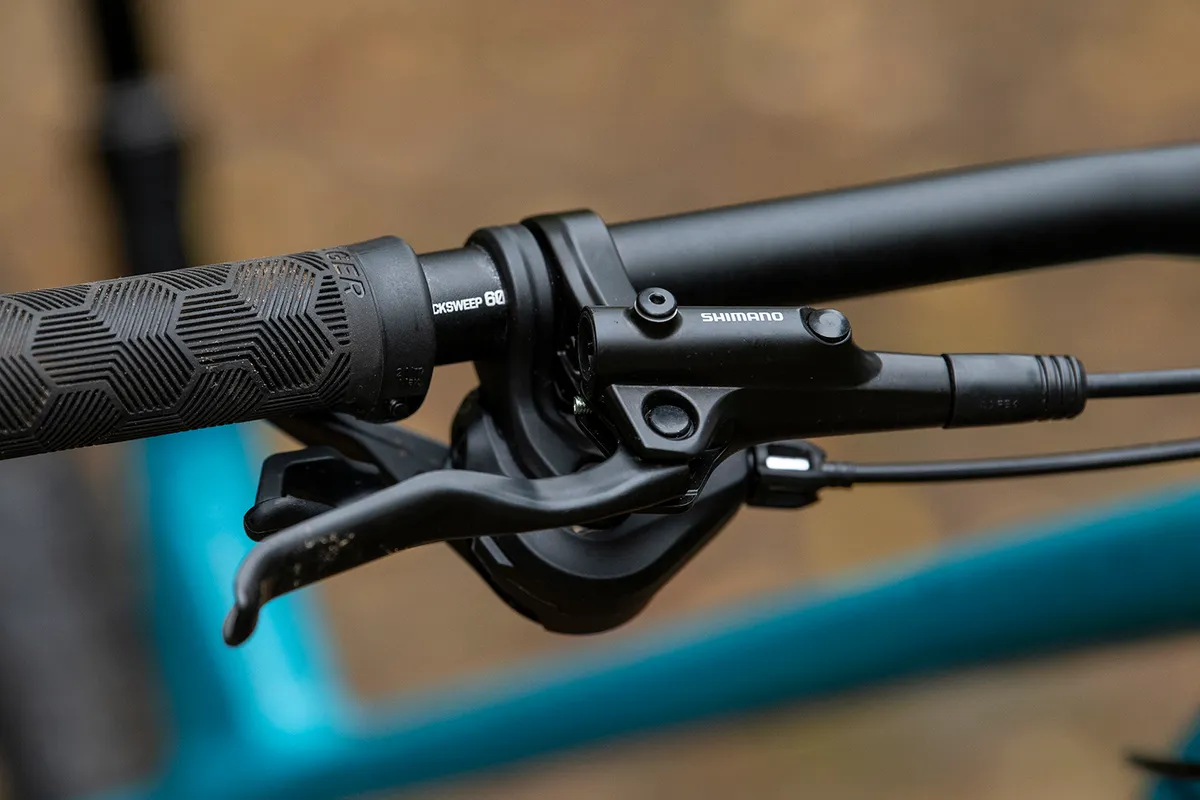
However, they still feature reach adjustment to help setup for your hand size.
Otherwise, most of the remaining kit is from Bontrager, Trek's in-house brand, including the Line Comp 30 wheels with a 30mm internal rim width. These support the wide 2.6in XR4 Team Issue tyres.
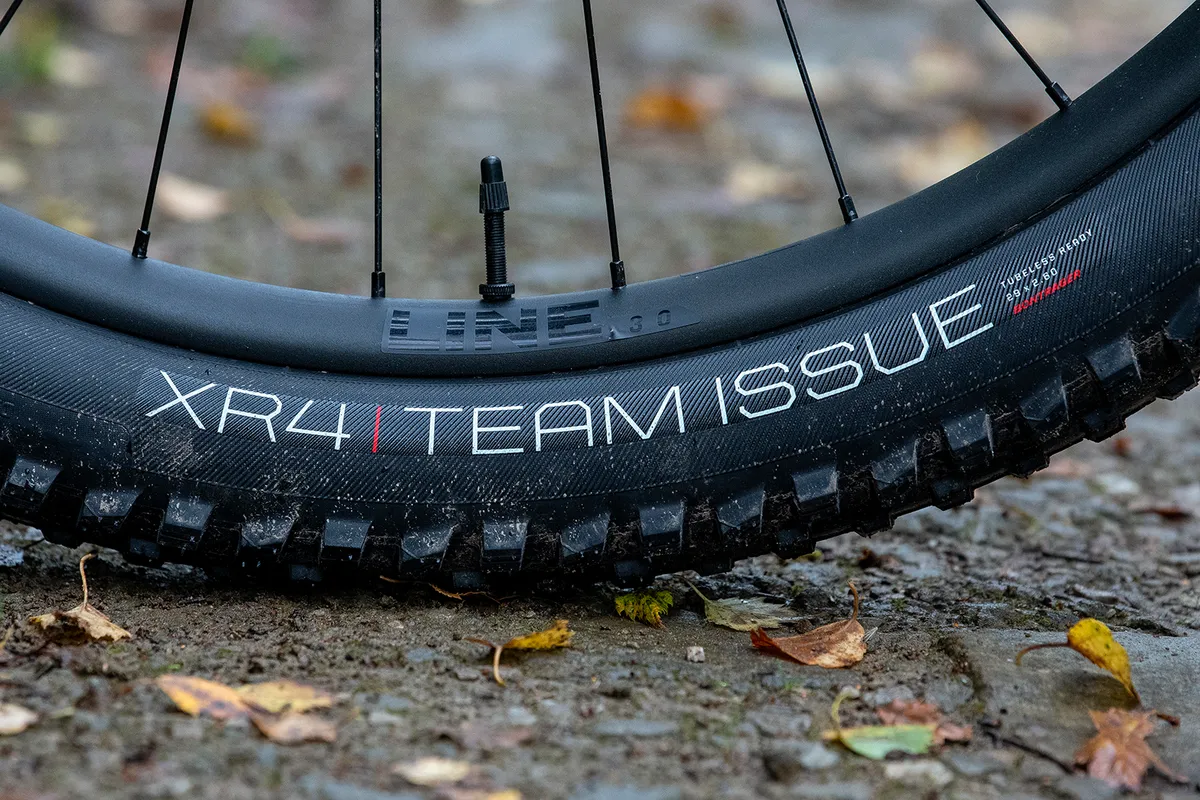
The cockpit's 780mm bar and 50mm stem are from Bontrager also, and it’s good to see Trek speccing wider bars and shorter stems for better control and handling.
The dropper post is from TranzX, and our size large test bike uses a 150mm drop.
Trek Roscoe 7 ride impressions
I tested the Roscoe at several of my favourite riding spots around the Forest of Dean, and my local woods, in both rain and shine.
Trails ranged from flowing blues to steep off-piste tech and everything in between, with the majority spent on natural singletrack.
Setup was pretty simple being a hardtail, but I found that I needed more air pressure in the forks than recommended.
Trek Roscoe 7 climbing performance
For the most part, the seated pedalling position on the Roscoe is good, and it’s a comfortable bike to ride.
The 74.7-degree effective top tube puts you in an efficient pedalling position, and I never felt the pedals were too far in front of me, even with my clipless cleats slammed as far back as they can go in my shoes.
I felt I was in a strong position to put the power down when needed.
The weight distribution between the wheels is okay. However, on steeper climbs, the short 430mm chainstay and longer 470mm reach on the size large meant I did have to shuffle forwards on the saddle to keep the front wheel tracking well.
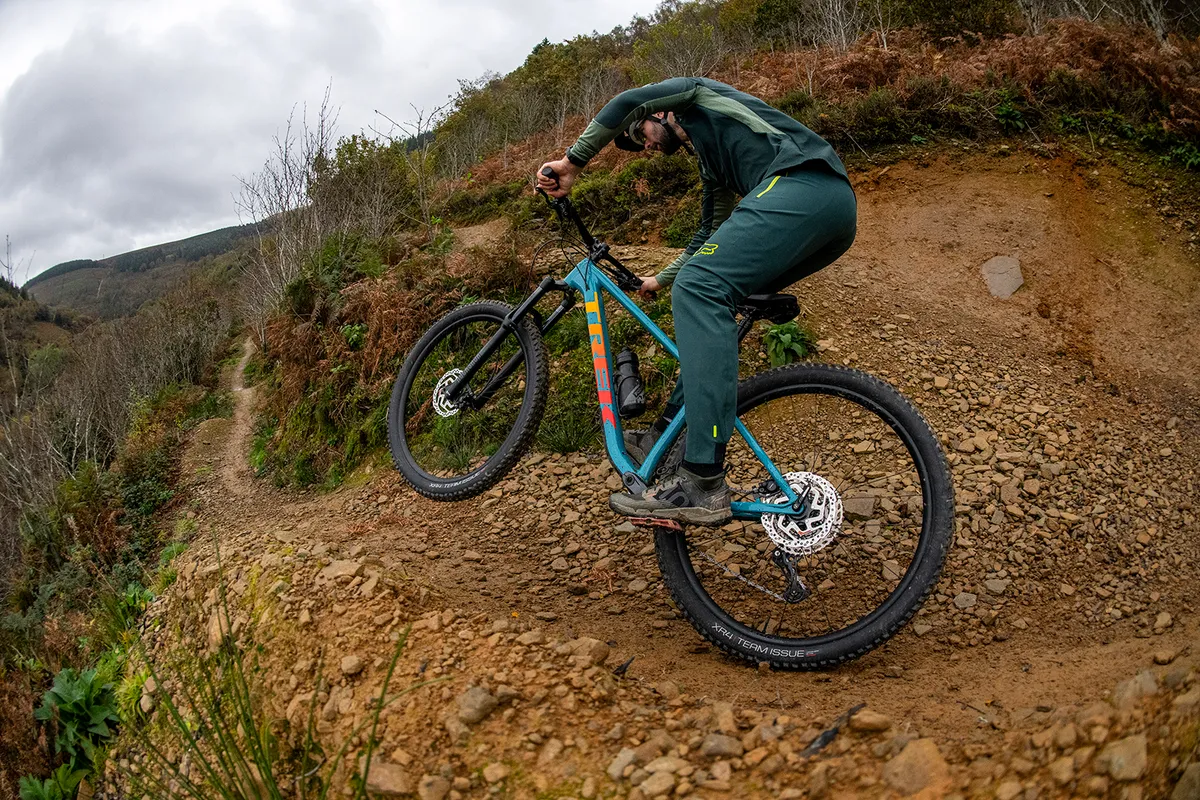
I noticed with the Trek how big the tyres are, especially compared to other bikes in a similar category.
Even though they measure at 2.5 inches (63mm) wide, they have a large volume, especially compared to the 2.6in Vee Snap tyres on the comparable Saracen Zenith Elite that measure just 2.35in (60mm).
It gives the Trek a tractor-like character, which has pros and cons. The bigger volume offers excellent comfort and additional puncture protection, so you can get away with running slightly lower pressures.
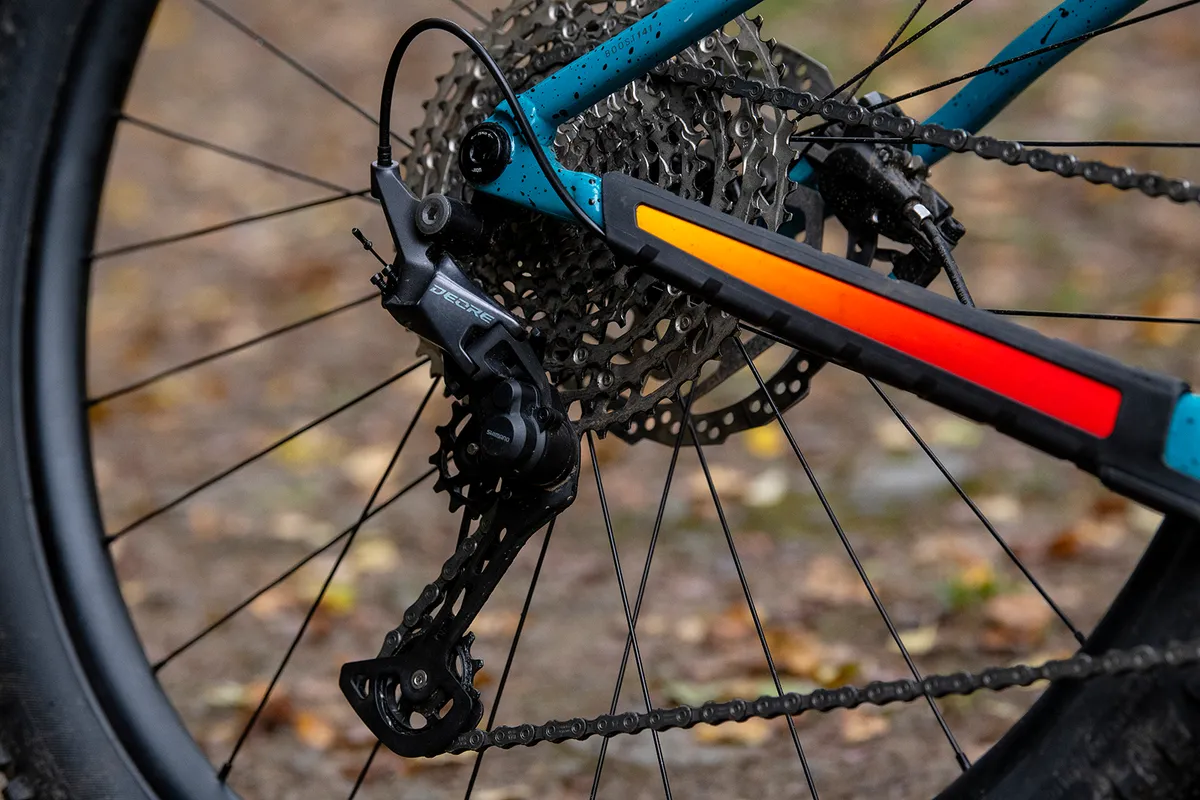
This is great for helping smooth out trail chatter and finding traction on climbs, and it sure makes the Roscoe one of the comfier hardtails out there.
I had zero complaints about Shimano’s 1x12 Deore drivetrain, which worked with the feeling of more expensive parts.
The gear range was ample, the shifting felt crisp and I was confident and happy with their performance when shifting under load.
Trek Roscoe 7 descending performance
Overall, the Trek was a fun bike to ride. The 140mm forks, the cushioning of the tyres and 65-degree head tube angle meant it smoothed out the trails impressively and gave confidence to its handling in all but the highest-speed turns.
The low-slung top tube gives you space to move the bike side-to-side underneath you, and the 150mm dropper post keeps the saddle out of the way.
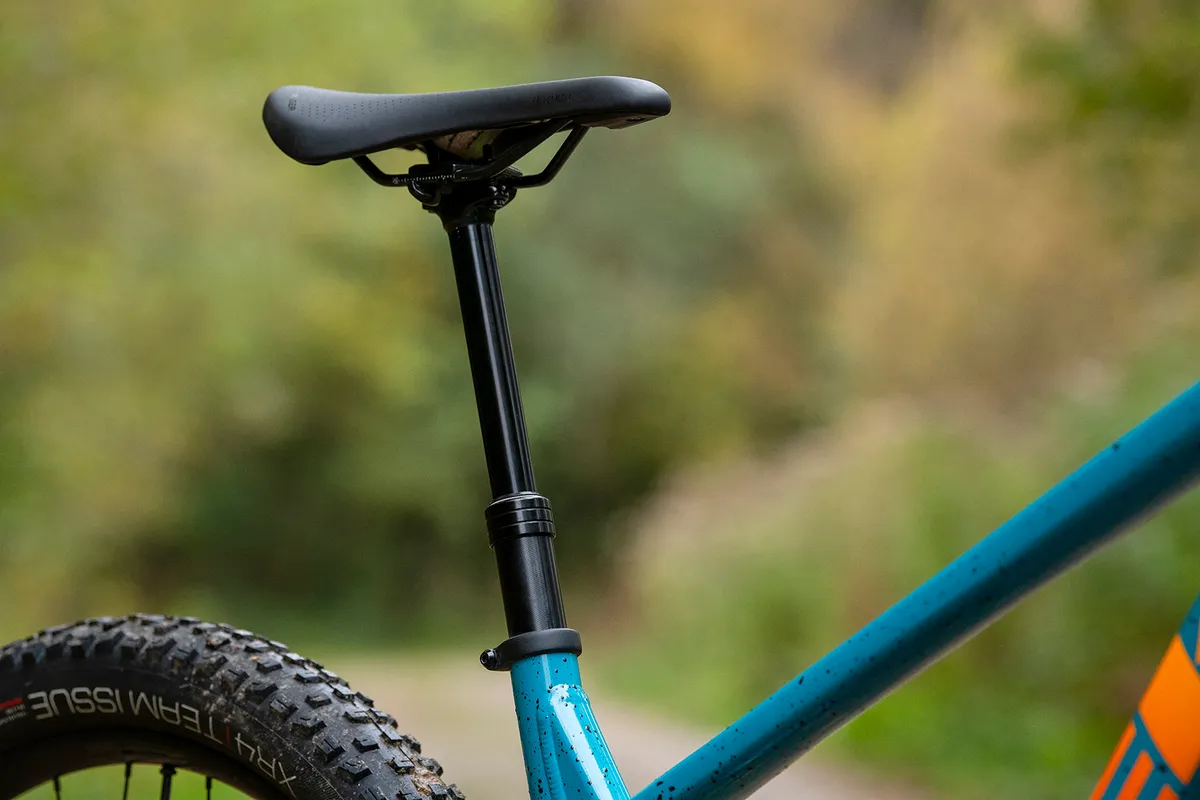
The short rear end does help liven the ride up and makes the Roscoe more agile, but it’s not the most poppy hardtail out there.
I’d say it prefers to carve through the corners instead of being thrashed around, although quick changes of direction aren’t a hindrance.
However, when pushed hard on faster downhill trails, the wide tyres tend to squirm and have a vague feeling. It’s not a lack of grip, just that you can feel the tyres roll on the rim, which is unnerving.
I wasn’t too impressed with the TranzX dropper post, which had a little more friction than other cheaper posts I’ve used. It got the job done when needed but isn’t as refined as other posts.
The brakes were adequate for mellow trails but became overwhelmed on steeper sections and in wet conditions.
I did find the RockShox Recon fork needed higher air pressures than recommended. However, the performance was still admirable, with good progression while remaining sensitive enough off the top.
The 32mm stanchions can become out-gunned, but this only becomes noticeable when pushing harder down technical descents.
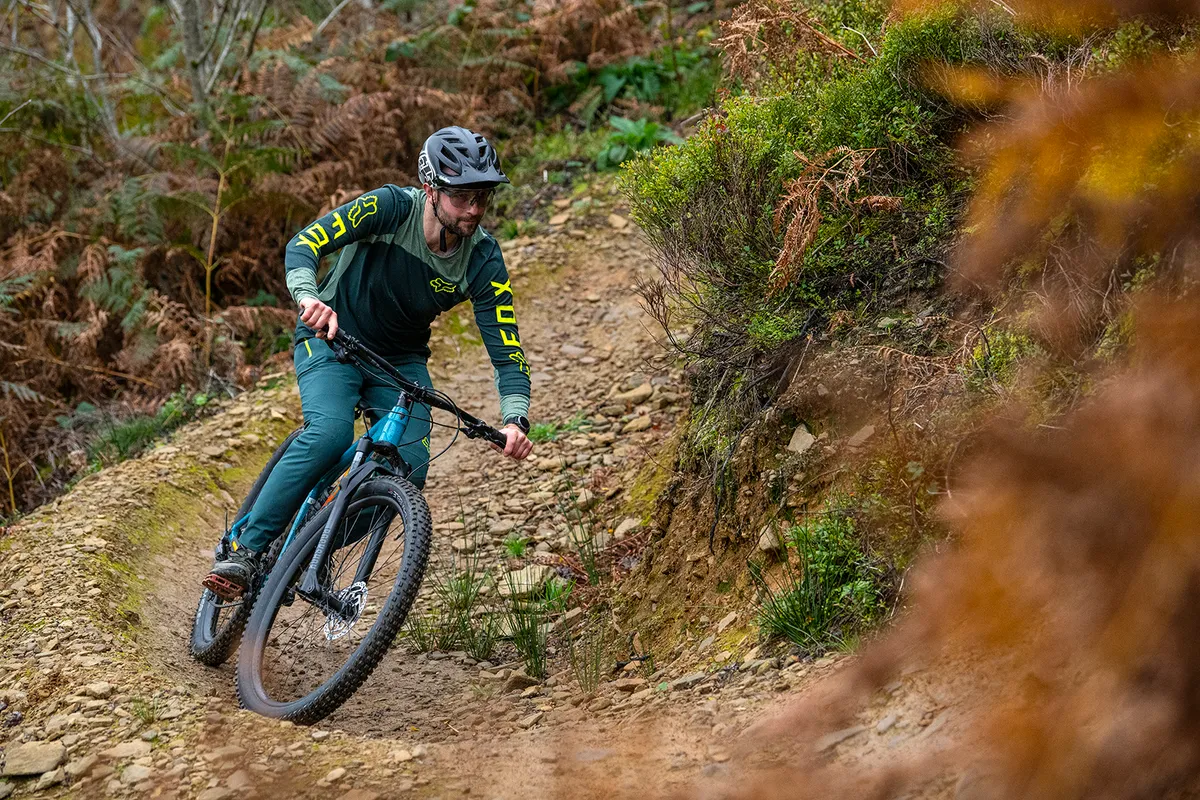
A part of this will be down to the tyres, but I never felt the ride was overly harsh or fatiguing. The frame feels stiff and direct but doesn’t compromise comfort.
The frame protection for a bike at this price is impressive, and it does help to quieten the bike down, which is a bonus.
Trek Roscoe 7 bottom line
For the money, the Trek is a capable performer and can be pushed harder than you might expect. It takes the buzz out of the trails and is happy pedalling for all-day epics or blasts around the local woods.
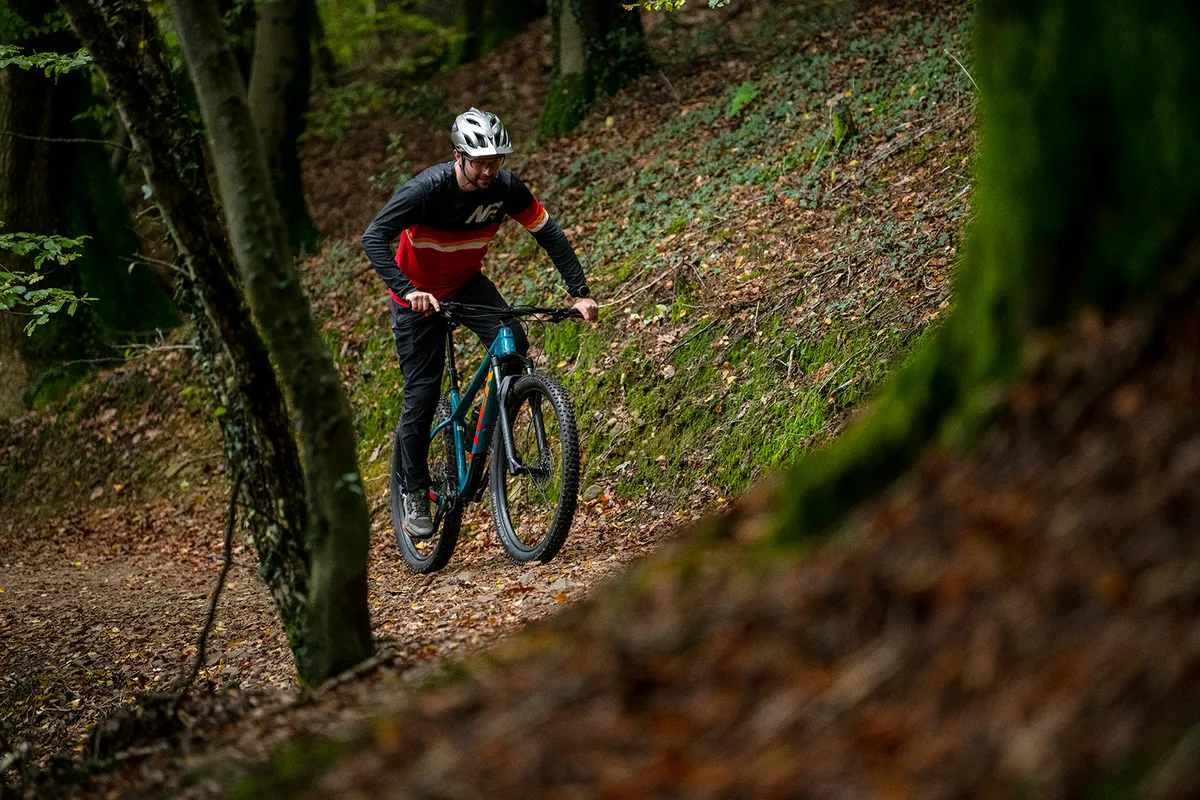
The brakes and dropper post are the biggest flaws, but these can be upgraded over time, and the Roscoe’s new geometry should keep it relevant for a while.
So if you’re looking for a fun mountain bike experience without breaking the bank, the new Roscoe is worth a second take.
How we tested
The £1,500 mark has become a highly competitive price point for hardtail mountain bikes in recent years, with many brands offering versatile builds that pack in a solid spec for the money.
We put four trail-focused hardtails around the £1,500 mark to the test to see which came out on top.
All four of the bikes on test are built tough to withstand some abuse, so while they may not be as fast over the roughest terrain as a more expensive full-suspension rig, they shouldn’t be any less fun to ride.
While the hardtails tested here all serve a similar purpose, individual brands often prioritise different ride characteristics, giving each machine its own feel. These reviews and our in-depth buyer’s guide to the best hardtail mountain bikes should help narrow down the choice.
Other bikes on test
Product
| Brand | trek |
| Price | 2200.00 AUD,1549.00 EUR,1400.00 GBP,1730.00 USD |
| Weight | 14.7300, GRAM (L) - |
Features
| Fork | RockShox Recon Silver RL, SoloAir spring, Motion Control damper, 140mm travel |
| br_stem | Bontrager alloy, 31.8 mm, Blendr compatible |
| br_chain | Shimano Deore M6100, 12-speed |
| br_frame | Alpha Gold Aluminium |
| Tyres | Bontrager XR4 Team Issue, Tubeless Ready, Inner Strength sidewalls, aramid bead, 120 tpi, 29x2.60in (size S: 27.5x2.60in) |
| br_brakes | Shimano MT200 hydraulic disc, 180mm rotors |
| br_cranks | Shimano MT511, 30T steel ring, Boost |
| br_saddle | Bontrager Arvada, steel rails |
| br_wheels | Bontrager Line Comp 30, Tubeless Ready |
| br_headset | FSA |
| br_shifter | Shimano Deore M6100, 12-speed |
| br_cassette | Shimano Deore M6100, 10-51, 12-speed |
| br_seatpost | TranzX JD-YSP18 |
| br_gripsTape | Bontrager XR Trail Comp, nylon lock-on |
| br_handlebar | Bontrager alloy |
| br_bottomBracket | Shimano SM-BB52 |
| br_availableSizes | XS, S, M, M/L, L, XL |
| br_rearDerailleur | Shimano Deore M6100, long cage |

